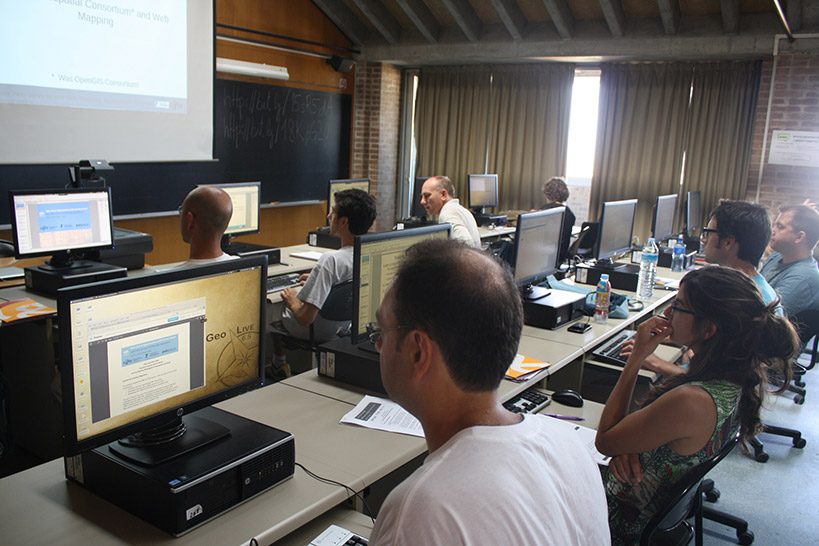Last week Alberto Romeu and me had the pleasure to participate at the fourth edition of this summer school organized by the GIS and Remote Sensing department of the University of Girona. This is the very same team that organizes the Spanish FOSS4G (Jornadas de SIG libre) and the Spanish version of the international UNIGIS master.
We did last three days of the summer school, first day on GeoServer, second on OpenLayersand the last one on GeoExt and OpenGeo Suite Client SDK (formerly GXP). On their first two days the students had lectures on Open Source, PostGIS and OGC standards, so the complete summers school offered a great outlook on the publication of geospatial data using standards and Open Source software.
We did also a small lecture on HTML/CSS and JavaScript as many of the students had no experience on development. Furthermore, for many of them it was their first contact with a Linux desktop, as they used OSGeo Live for all their practical work . They really learned A LOT.
Our experience was great, very exhausting, but at the end most of them enjoyed the exercises and results, even with the tight schedule. Being two at the classroom helped a lot, as one was giving the lecture the other was helping the students with their issues, small computer problems, etc. We tried to cover as much as we could and give them open exercises to continue their own self training at their places afterwards. In fact for us is always a key objective of the trainings to give the students tools to continue learning by themselves. Specially on development topics, one needs to go home, grab a big cup of coffee and dive into the materials, experiment on your own and learn by failure. As I told them, we have to get used to failure, debugging a web application is on the most important skills one needs to learn, the sooner one gets into it, the better.
Our materials were almost all entirely based on awesome OpenGeo workshops. We forked their GitHub repo into a new one to remove anything we didn’t need and modify the materials to work with the OSGeo Live set up. As all the materials were written with Sphinx, we were able to set up one project on Read The Docs per workshop. Read The Docs is a great hosting for Sphinx based documentation, one can hook the GitHub repo with the service so on every push the docs are regenerated and everything is always updated. Even more, they not only produce the HTML website, but also PDF, ePub and HTML zipped versions so one can use all the materials off-line if needed.
Finally, another cool resource that we used a lot during the three days was a kind of real time sharing page called HackPad. Our Hackpad was updated all time with links, small advices and anything interesting that was appearing over the lessons. In fact one of the students was proactive on helping us with the contents. You’ll find all the links to the workshops, slides and resoruces on the hackpad.





